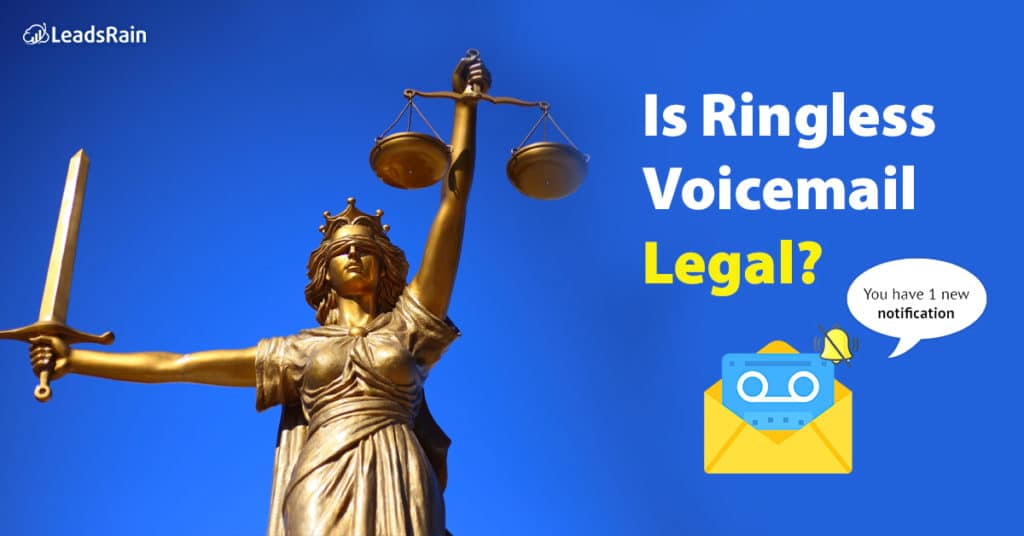Before indulging in the topic of whether Ringless Voicemail (RVM) are legal, let me first explain what makes this such an important question. And while other platforms claim that this is very complicated, you will find a crystal-clear explanation here.
It is not so complicated to understand actually. Ringless Voicemail service, or Direct-to-Voicemail as many call it, is a technology that transfers a pre-recorded message directly into the recipients’ voicemail box without making a call so as to avoid the phone from ringing. This is done through a server-to-server connection.
Now, to identify whether the RVM needs to comply with the TCPA regulations?
The TCPA regulations say that any marketing calls made, need to first derive a written consent from the recipient about receiving such calls. Simple as this sounds, TCPA has a very different definition for “calls” which is very important to understand. TCPA has stated that SMS, which is a textual form of communication over the phone, is also categorized as a form of calling, which is why SMS marketing also needs to comply with the TCPA regulations. The classification is because it uses a telephonic medium to communicate. For the same reason, even RVM has been classified as a call. This means, the Ringless Voicemail campaign MUST be TCPA compliant. This means that contacts on the Do Not Call registry cannot be targeted through this technology.
Now that it’s clear, here is a second part to this question.
TCPA also states that along with this rule, state regulations also apply to these marketing calls. Now, to make this clear, I will simply answer the REAL question you have:
“Is there a State in which Ringless Voicemail is Illegal?”
The simple answer to that is, NO, you can run an RVM campaign in every State in the US. So here is the tad bit complicated part. For you to execute an RVM campaign, each State requires different regulations to follow. Most of them are actually quite similar, but it is important to look into all of these factors.
Q. Are Ringless Voicemail Drops legal in Florida?
A. Ringless Voicemail Drops are legal in the State of Florida but come the 1st of July, 2018, they must be TCPA compliant. Which means, it needs to be consent-based communication to be legal. If the contact numbers are DNC listed or you do not have consent from them to receive any communication from you, then your RVM campaign could land you into trouble.
Q. Are Ringless Voicemail Drops legal in California?
A. California Federal Laws do not constitute RVM as illegal. More so, the Public Utility Code 2872 states that making a pre-recorded voice call to a recipient is allowed if, “that is used solely to transmit a message to an established business associate, customer, or other person having an established relationship with the person using the automatic dialing-announcing device to transmit the message, or to any call generated at the request of the recipient. Public Utilities Code § 2872(f)”
Q. Are Ringless Voicemail Drops legal in Maryland?
A. Maryland has not classified Ringless Voicemail drops as illegal, however, the Maryland Telephone Consumer Protection Act (MTCPA) states that the calls must comply with the Code of Federal Regulations, about the do-not-call registry. An important point to note here is that the regulations allow the means of telecommunication for commercial purposes which ARE NOT of the nature of advertisements or telemarketing. Which makes RVM for reminder campaigns completely legal. However, for this again, you would require consent from the recipients.
Q. Are Ringless Voicemail Drops legal in Texas?
A. Ringless Voicemail Drops are legal in Texas and the laws are quite lenient here about the same. However, it is a must to get the consent first, and scrub the data of the state DNC list.
Q. Are Ringless Voicemail Drops legal in Virginia?
A. In the state of Virginia, the Ringless Voicemail Drops are permitted, provided that your intent for communication is made clear along with the brand name. Again, consent is a must for an RVM campaign. If the data being called have not given you the consent, and the recipient files a case, the court is going to interpret it as a call made through a predictive dialer that randomly generates numbers which is going to land your company into trouble. Hence, consent-oriented campaigns will be within moral lines and completely legal practice.
The reason why questions about Ringless Voicemail’s regulations keep appearing is that unlike other means of communicating through the phone like simple call or text, the ringless voicemail – due to reasons of not making the phone ring – it is not possible for the recipient to opt-out. This is a major reason why the regulatory bodies are closely eyeing this technology. As a user of this technology, it should be remembered to scrub the data from the State and National DNC list.
Additionally, provide a toll-free number so that the recipients can call in case they want to opt-out, and maintain transparent communication and introduce themselves initially before ensuing with the communication.
